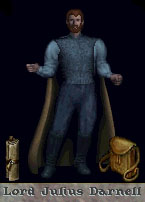![]() We have a Discord now - Join if you want to Contribute!
We have a Discord now - Join if you want to Contribute!![]()
Site Updates Coming Soon!
BNN: Interview with Lord Julius Darnell
Garth Ranzz January 18, 1999
Lord Julius Darnell has a long and storied career upholding the law in Lord British’s courts. Intrigued by his position as Prosecutor of the “FoA Leader trial”, I was assigned to meet the man, and find out what makes him tick. We met in his estate outside of Britain. Lavishly appointed, and decorated with many works of art, I was struck by both the refinement and opulence of his daily surroundings. After being served tea by his attentive staff, we began the interview....
- Garth Ranzz: Can you give our readers a bit of your background?
- Lord Darnell: Certainly. I’ve served the King’s Courts for nearly two decades as a Prosecutor, and am closing on my one-hundredth case in that service.
- GR: Your father, Lord Averil Darnell, was also a lawyer?
- LD: Indeed. In point of fact, the practice of law goes back four generations in my family.
- GR: What drew you to law as a career?
- LD: Well, as I said, it was a family tradition—one I am quite proud to continue, might I add—but my course was set quite young.
- GR: Actually, Lord Darnell, I was referring to your personal interest in the subject.
- LD: Ah. I would say that I am particularly interested in society.
- GR: How do you mean?
- LD: The law is a measure of the progress a society has made towards civilization. Individuals must understand that the actions that they take have a great impact on those around them. If a man were to, say, steal another’s food, he is depriving that other of the ability to feed his family. Now, let us posit the victim of the crime is, for example, a healer—with less food he grows weaker, and is less able to do the job he has set to do. If the thief grows ill, he must turn to the healer to set him right—but the healer’s ability to do his job has been negatively impacted. Do you see? Each of us, as individuals, are dependent upon those around us in numerous ways - some obvious, some less so.
- GR: How would you answer those that say that as the law is a creation of man, and man is a flawed creature, therefore law must be flawed?
- LD: Pish. The needs of the many are of a greater primacy then the needs of the few. The law is merely a way of codifying that. It is a hallmark of a civilization to address these issues as social beings rather than to fall upon each other with open steel. As time, and the needs of a society change, so then do the laws which they need to protect that society.
- GR: So you see the law as a form of societal protection?
- LD: Order must be secured—I would argue by any civilized means necessary. A healthy society should always have room for debate and opposition, but such must be done within the boundaries of the law. To remove that debate from the public eye; or to engage in unlawful acts against the State or its Citizens—this is Treason. It is one thing to discuss changes we would like to see in our government—in fact, I would hope that every Citizen sees this as their duty and obligation—but it is quite another thing to engage in unlawful behavior. The law is the only thing that differentiates between us and, say, orcs.
- GR: Your critics would charge that you’ve been blessed with affluence and political connections—making it very easy for you to take such a position...
- LD: My personal finances have always been a place where my foes have tried to attack, but I believe the record clearly shows how much good the Darnell family has done for the Realm. Certainly, I enjoy hosting parties, wearing fine clothes, eating well—but my entire life has been dedicated to public service. Why just last night Lady Darnell and myself hosted an event for Moonglow flood relief.
Having said that, I don’t think being a societal malcontent has a great deal to do with wealth, or lack thereof—look at the self-proclaimed “Followers of Armageddon”: clearly they were both well-financed, and well-organized. I would go so far as to say that most seditionists are in it for the personal power they can claim in the name of their “movement”—usually at the direct expense of those that follow same.
- GR: You’re speaking of the FoA Leader?
- LD: It would be inappropriate for me to specifically comment on this man at this stage in the process.
- GR: But you’re convinced of his guilt.
- LD: What I am convinced is that as the State is given the chance to present its case, we will incontrovertibly show the magnitude of the FoA’s crimes to even the most ardent cynic. The evidence is overwhelming—from “simple” murder and kidnapping to attempted regicide and genocide, I don’t think by the end of this process there will be any doubt as to whom the guilty parties are.
This trial is an important benchmark for the Citizens of the Realm—do we let the rule of law and civilization take root and flourish, or will we descend into mere Anarchy?
- GR: Thank you for your time, Lord Darnell.
- LD: My utmost pleasure.
